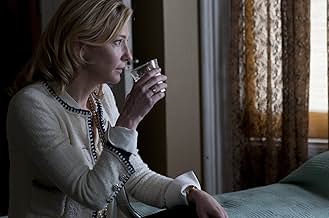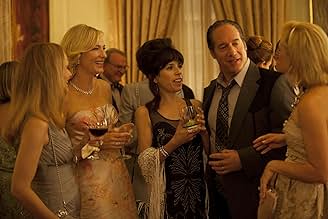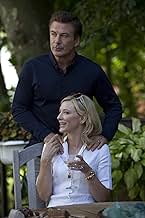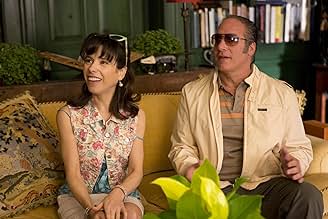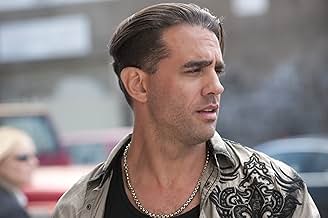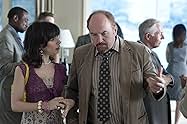Una donna mondana newyorkese, dallo stato emotivo instabile e incapace di accettare la realtà, si trasferisce a San Francisco dalla sorella. La donna conserva il suo grande stile, ma con sé ... Leggi tuttoUna donna mondana newyorkese, dallo stato emotivo instabile e incapace di accettare la realtà, si trasferisce a San Francisco dalla sorella. La donna conserva il suo grande stile, ma con sé non porta soldi, pace o amore...Una donna mondana newyorkese, dallo stato emotivo instabile e incapace di accettare la realtà, si trasferisce a San Francisco dalla sorella. La donna conserva il suo grande stile, ma con sé non porta soldi, pace o amore...
- Regia
- Sceneggiatura
- Star
- Vincitore di 1 Oscar
- 56 vittorie e 83 candidature totali
Recensioni in evidenza
Sometimes it feels like Woody Allen is deliberately hit and miss. Every other film appears to be a winner so it's become easy to just skip the mediocre ones. I thought Midnight In Paris was pretty good but I felt like its idea wasn't explored well enough and it became too repetitive. Blue Jasmine is a film that feels like it'll be another basic story at first then as the tragedy slowly unravels, it becomes all the more fascinating. At first the film's structure of flashbacking without transition is a little frustrating as the present time doesn't give you much to chew on in the first place, but it soon becomes clear that this was the only way to tell this brilliant and complex story of a woman's place in the world. Cate Blanchett is setting the reviews on fire and she certainly deserves it. I've always loved her engrossing theatrical style in films like The Aviator and The Curious Case of Benjamin Button and I've missed her since.
Here she is in full force as she switches from glamour to glare seamlessly and effortlessly. Blanchett has often played strong women and she tiptoes the line of Jasmine's strength and vulnerability both with and without sympathy. It's incredible to watch. Although I was concerned I was going to only appreciate the performance and not connect with the character, I ended up finding her struggle to feel useful in the working world and not knowing how to achieve her ambitions to cut deep into the first world human anxieties about identity and self- worth. It's great to have a film that addresses those issues so earnestly, without feeling self- pitying. Although the spotlight is on her, there's plenty of room for the supporting players to shine with the delightful comic relief performances from Louis C.K., Michael Stuhlberg and Max Casella and deceptively charming performances from Alec Baldwin, Andrew Dice Clay and Peter Sarsgaard. The real talent on the side belongs to Sally Hawkins and Bobby Cannavale who give compelling and heartbreaking performances.
I like how Allen has such confidence in his shooting style of simple wides and closeups that he doesn't let it get in the way of the story but sometimes it does feel bland rather than just Woody's brand. It sometimes feels like the story is taking uninteresting broad strokes with its archetypes but when the details come in like a mystery novel, they enrichen the story and leave just before they drown you making you want more. Perhaps Allen could've made a better job of making me intrigued in the details but that makes the pay-offs all the more sweeter. However, I'm not quite sure what to make of the ending, perhaps Allen is trying to say there's some people who can and can't be fixed, I'm not sure, but it's a fascinating tragic comic tale nonetheless. Maybe it's intended as a punishment film regarding the sin of greed. That would make sense though it wouldn't be as satisfying. It's been compared to A Streetcar Named Desire a lot but I don't remember much of that story despite having seen it twice. I think I prefer Blue Jasmine. One of Allen's most unsuspecting heavyweight films in a long time.
8/10
Here she is in full force as she switches from glamour to glare seamlessly and effortlessly. Blanchett has often played strong women and she tiptoes the line of Jasmine's strength and vulnerability both with and without sympathy. It's incredible to watch. Although I was concerned I was going to only appreciate the performance and not connect with the character, I ended up finding her struggle to feel useful in the working world and not knowing how to achieve her ambitions to cut deep into the first world human anxieties about identity and self- worth. It's great to have a film that addresses those issues so earnestly, without feeling self- pitying. Although the spotlight is on her, there's plenty of room for the supporting players to shine with the delightful comic relief performances from Louis C.K., Michael Stuhlberg and Max Casella and deceptively charming performances from Alec Baldwin, Andrew Dice Clay and Peter Sarsgaard. The real talent on the side belongs to Sally Hawkins and Bobby Cannavale who give compelling and heartbreaking performances.
I like how Allen has such confidence in his shooting style of simple wides and closeups that he doesn't let it get in the way of the story but sometimes it does feel bland rather than just Woody's brand. It sometimes feels like the story is taking uninteresting broad strokes with its archetypes but when the details come in like a mystery novel, they enrichen the story and leave just before they drown you making you want more. Perhaps Allen could've made a better job of making me intrigued in the details but that makes the pay-offs all the more sweeter. However, I'm not quite sure what to make of the ending, perhaps Allen is trying to say there's some people who can and can't be fixed, I'm not sure, but it's a fascinating tragic comic tale nonetheless. Maybe it's intended as a punishment film regarding the sin of greed. That would make sense though it wouldn't be as satisfying. It's been compared to A Streetcar Named Desire a lot but I don't remember much of that story despite having seen it twice. I think I prefer Blue Jasmine. One of Allen's most unsuspecting heavyweight films in a long time.
8/10
"Who do you have to sleep with around here to get a Stoli martini with a twist of lemon?"
Woody Allen has returned to the States for this film after experiencing some extended vacations over Europe (To Rome with Love, Midnight in Paris, You Will Meet a Tall Dark Stranger, and Vicky Cristina Barcelona), and this time the story takes place mostly in San Francisco, although we do get several interesting flashbacks in New York (Allen's favorite filming location). I mention these locations because in most of his films these cities are actual characters and sometimes even main ones. There were two general criticisms I had read about Blue Jasmine before watching it, one was that this was Woody Allen's return to form and the second was that Cate Blanchett's performance was magnificent. I agree with the second statement because Blanchett delivers one of the best performances of the year and she is the main reason why this film actually worked for me. As for the second statement I have to differ because I thought Midnight in Paris was his best recent film and I enjoyed it much more than Blue Jasmine. I do have to say that Woody Allen's capacity for writing and directing these films in such a short period of time (he's directed one every year for the past decades) impresses me. He has a unique voice in all of his films that sometimes make me picture him talking through each one of his characters. I remember something similar happening to me during college when I would be reading over my notes as I studied for a final exam actually listening to my professors unique voice in my head as I read. This is what happens to me often during a Woody Allen film as I imagine his head popping over one of his characters. It happened during this film as well, except for Blanchett's character who managed to bring her unique style which took a voice of its own. She deserves all the accolades she's been receiving from her peers and critics alike. It was a wonderful performance and an affecting one as well.
Jasmine (Cate Blanchett) was a New York socialite who lived a happy and blessed life with her husband Hal (Alec Baldwin), until he was sent to prison for fraudulent business acts. We get to discover some darker secrets about their past as the story unravels through flashbacks, but the film opens at the present as Jasmine is returning to San Francisco to live with her sister, Ginger (Sally Hawkins) and her two sons, completely broke. She has experienced several mental breakdowns due to her traumatic past, and despite being estranged from her sister during that time, Ginger takes her in. Jasmine imposes on Ginger who wasn't as blessed as she was and is working at a grocery store while dating Chili (Bobby Canavale). Jasmine and Chili don't get along too well as she has interfered in his plans to move in with Ginger. Jasmine is always telling her that she should find someone better like she did (which wasn't really the case) and that is the reason for the constant friction between them. In San Francisco, Jasmine meets another wealthy man named Dwight (Peter Saarsgard) who she begins dating, and which gives her hope that she will recover her past glory, but her constant lies begin catching up with her affecting her relationship with him and her sister.
I wouldn't say this is a character driven story because I felt a lot of them were one dimensional characters, with the exception of Jasmine of course. The people in Woody Allen's films don't tend to feel real or authentic at times, and they usually are just cartoonish caricatures from a bubbled world. Allen's films aren't the laugh out loud type either, I find them funny in a rather witty way. He is slick at times and the scenes put a smile on your face, but they don't have you laughing hysterically. Blanchett does manage to portray Jasmine in a more authentic and believable way, showing her flaws and inner struggles with her mental illness. It's a character that we find hard to sympathize with, but also feel sorry for as her life begins falling apart. She's the type of person who cannot be on her own and is always depending on someone. I also liked the way in which Woody Allen told the story and let the past unravel smoothly through flashbacks revealing several things about her character. This along with Blanchett's performance is what saves the movie and makes it entertaining, but I wouldn't agree with the critics who are saying this is Allen's best work in years. I do agree it is perhaps his most tragic and darkest comedy in recent years.
http://estebueno10.blogspot.com/
Woody Allen has returned to the States for this film after experiencing some extended vacations over Europe (To Rome with Love, Midnight in Paris, You Will Meet a Tall Dark Stranger, and Vicky Cristina Barcelona), and this time the story takes place mostly in San Francisco, although we do get several interesting flashbacks in New York (Allen's favorite filming location). I mention these locations because in most of his films these cities are actual characters and sometimes even main ones. There were two general criticisms I had read about Blue Jasmine before watching it, one was that this was Woody Allen's return to form and the second was that Cate Blanchett's performance was magnificent. I agree with the second statement because Blanchett delivers one of the best performances of the year and she is the main reason why this film actually worked for me. As for the second statement I have to differ because I thought Midnight in Paris was his best recent film and I enjoyed it much more than Blue Jasmine. I do have to say that Woody Allen's capacity for writing and directing these films in such a short period of time (he's directed one every year for the past decades) impresses me. He has a unique voice in all of his films that sometimes make me picture him talking through each one of his characters. I remember something similar happening to me during college when I would be reading over my notes as I studied for a final exam actually listening to my professors unique voice in my head as I read. This is what happens to me often during a Woody Allen film as I imagine his head popping over one of his characters. It happened during this film as well, except for Blanchett's character who managed to bring her unique style which took a voice of its own. She deserves all the accolades she's been receiving from her peers and critics alike. It was a wonderful performance and an affecting one as well.
Jasmine (Cate Blanchett) was a New York socialite who lived a happy and blessed life with her husband Hal (Alec Baldwin), until he was sent to prison for fraudulent business acts. We get to discover some darker secrets about their past as the story unravels through flashbacks, but the film opens at the present as Jasmine is returning to San Francisco to live with her sister, Ginger (Sally Hawkins) and her two sons, completely broke. She has experienced several mental breakdowns due to her traumatic past, and despite being estranged from her sister during that time, Ginger takes her in. Jasmine imposes on Ginger who wasn't as blessed as she was and is working at a grocery store while dating Chili (Bobby Canavale). Jasmine and Chili don't get along too well as she has interfered in his plans to move in with Ginger. Jasmine is always telling her that she should find someone better like she did (which wasn't really the case) and that is the reason for the constant friction between them. In San Francisco, Jasmine meets another wealthy man named Dwight (Peter Saarsgard) who she begins dating, and which gives her hope that she will recover her past glory, but her constant lies begin catching up with her affecting her relationship with him and her sister.
I wouldn't say this is a character driven story because I felt a lot of them were one dimensional characters, with the exception of Jasmine of course. The people in Woody Allen's films don't tend to feel real or authentic at times, and they usually are just cartoonish caricatures from a bubbled world. Allen's films aren't the laugh out loud type either, I find them funny in a rather witty way. He is slick at times and the scenes put a smile on your face, but they don't have you laughing hysterically. Blanchett does manage to portray Jasmine in a more authentic and believable way, showing her flaws and inner struggles with her mental illness. It's a character that we find hard to sympathize with, but also feel sorry for as her life begins falling apart. She's the type of person who cannot be on her own and is always depending on someone. I also liked the way in which Woody Allen told the story and let the past unravel smoothly through flashbacks revealing several things about her character. This along with Blanchett's performance is what saves the movie and makes it entertaining, but I wouldn't agree with the critics who are saying this is Allen's best work in years. I do agree it is perhaps his most tragic and darkest comedy in recent years.
http://estebueno10.blogspot.com/
If you want to see this year's master class in screen acting, you need to watch Cate Blanchett's mesmerizing performance as Jasmine French, a delusional Park Avenue socialite wife in Woody Allen's 45th directorial effort, a sly, bicoastal update of Tennessee Williams' classic "A Streetcar Named Desire". As the film opens, her impeccably dressed character has hit rock bottom after her financial wizard of a husband is arrested and her assets are liquidated. In the throes of a nervous breakdown, she arrives in San Francisco and moves in with her kind- hearted sister Ginger who lives a modest, blue-collar life in a tiny apartment on the edge of the Mission – on South Van Ness near 14th Street to be exact - with her two hyperactive sons. You can tell Jasmine is not only out of her element but quite judgmental about how her sister's life has turned out. The irony of Jasmine's patronizing attitude is that she is a habitual liar who is so angry about her destitute circumstances that she frequently talks to herself. The story follows the basic outline of "Streetcar" but takes some interesting turns, for instance, when she tries to better herself by taking computer classes while working as a receptionist at a dental office.
Allen has crafted his film into a clever juxtaposition of current and past events that feels jarring at first since it reflects Jasmine's precarious mental state but then melds into a dramatic arc which resonates far more than a straightforward chronology could have allowed. As a writer, he has become more vociferous in his dialogue without losing his wit. He doesn't pull punches when he showcases confrontations between his characters, whether it's between the two sisters, men and women, or people from different classes. Hostility can come in flammable torrents or in thinly veiled remarks. That Allen moves so dexterously in tone is a testament to his sharp ability in drawing out the truth in his actors. Blanchett is a wonder in this regard because there is something intensely fearless in her approach. Unafraid to lose audience sympathy for her character, she finds an innate sadness in Jasmine that makes us want to know what happens to her next. She also mines the sharp, class- based humor in Jasmine's struggles with one highlight a hilariously executed scene in a pizza restaurant where she explains to her confused nephews to "Tip big, boys".
The rest of the cast manage effective turns. Alec Baldwin plays Jasmine's swindler husband with almost effortless aplomb. Sally Hawkins brings a wonderful looseness to Ginger, Stella to Blanchett's Blanche, and finds a level of poignancy in her character's constant victimization at the hands of her sister as well as her brutish, blue-collar boyfriend Chili, played with comic fierceness by Bobby Cannavale in the Stanley Kowalski role. In a conveniently conceived role, Peter Sarsgaard gets uncharacteristically breezy as Dwight, a wealthy, erudite, and matrimonially available State Department diplomat who appears to be the answer to Jasmine's prayers, while Allen casts two unlikely comics in about-face roles – Andrew Dice Clay as Ginger's defeated ex-husband Augie and Louis C.K. as Al, an amorous suitor who brings Ginger a few moments of romantic salvation. Allen's European sojourn appears to have freed him up with the movement of characters in scenes and Javier Aguirresarobe's ("Vicky Cristina Barcelona") camera-work complies nicely. The San Francisco locations bring a nice geographic change to Allen's storytelling, and he only uses the Golden Gate Bridge in a long shot once from the Marin side. This is Allen's best work in quite a while, and Blanchett is the ideal muse for his tale.
Allen has crafted his film into a clever juxtaposition of current and past events that feels jarring at first since it reflects Jasmine's precarious mental state but then melds into a dramatic arc which resonates far more than a straightforward chronology could have allowed. As a writer, he has become more vociferous in his dialogue without losing his wit. He doesn't pull punches when he showcases confrontations between his characters, whether it's between the two sisters, men and women, or people from different classes. Hostility can come in flammable torrents or in thinly veiled remarks. That Allen moves so dexterously in tone is a testament to his sharp ability in drawing out the truth in his actors. Blanchett is a wonder in this regard because there is something intensely fearless in her approach. Unafraid to lose audience sympathy for her character, she finds an innate sadness in Jasmine that makes us want to know what happens to her next. She also mines the sharp, class- based humor in Jasmine's struggles with one highlight a hilariously executed scene in a pizza restaurant where she explains to her confused nephews to "Tip big, boys".
The rest of the cast manage effective turns. Alec Baldwin plays Jasmine's swindler husband with almost effortless aplomb. Sally Hawkins brings a wonderful looseness to Ginger, Stella to Blanchett's Blanche, and finds a level of poignancy in her character's constant victimization at the hands of her sister as well as her brutish, blue-collar boyfriend Chili, played with comic fierceness by Bobby Cannavale in the Stanley Kowalski role. In a conveniently conceived role, Peter Sarsgaard gets uncharacteristically breezy as Dwight, a wealthy, erudite, and matrimonially available State Department diplomat who appears to be the answer to Jasmine's prayers, while Allen casts two unlikely comics in about-face roles – Andrew Dice Clay as Ginger's defeated ex-husband Augie and Louis C.K. as Al, an amorous suitor who brings Ginger a few moments of romantic salvation. Allen's European sojourn appears to have freed him up with the movement of characters in scenes and Javier Aguirresarobe's ("Vicky Cristina Barcelona") camera-work complies nicely. The San Francisco locations bring a nice geographic change to Allen's storytelling, and he only uses the Golden Gate Bridge in a long shot once from the Marin side. This is Allen's best work in quite a while, and Blanchett is the ideal muse for his tale.
Woody Allen's finely tuned screen-writing skills and his talent for eliciting standout and often award-winning performances from his leading ladies are on full display in "Blue Jasmine." Alec Baldwin, the slick husband of a middle-aged socialite, Cate Blanchett, pulls a Bernie-Madoff swindle and ends up in jail. The homes, the cars, the furs, the jewels, the furniture all go to the Feds, and the penniless Cate flies first class to San Francisco with her Louis Vuitton luggage to stay with her non-biological sister, Sally Hawkins, until she gets back on her feet. Blanchett, the Jasmine of the title, is totally unprepared for her economic fall. She decides to become an interior designer, but wants to study on-line; however, she is computer illiterate and must take a course, before she can begin to study decorating; but, she needs money for the courses and takes a receptionist job with a lecherous dentist. Although the film addresses serious issues, the Allen humor will provoke smiles and an occasional chuckle, from small well-observed moments such as the attempts of indecisive patients to make dental appointments.
Understandably, Cate Blanchett's Jasmine teeters on the edge of a nervous breakdown; she lies instinctively, even to herself; and she cannot or will not face the reality of her downward mobility. The role is an actress's showcase, and Blanchett is in top form; her nervous rambling monologues, either to herself or to unwilling strangers, provide a study guide for aspiring actors. Jasmine brays at her "sister," Ginger, effortlessly and engagingly played by Hawkins; she nags about Ginger's job, lover, and living quarters, until Ginger points out Jasmine's own diminished situation. Jasmine bellows that Ginger can do better than her amorous boyfriend, Chili, a charismatic Bobby Cannavale with a bad haircut and faded tattoo; eventually, Ginger reminds her that her own choice of husband was less than stellar. Jasmine, Ginger, and Chili make an aromatic trio, whose names perhaps allude to their personalities, and they are ably supported by Louis C.K., a horny guy with the hots for Ginger, and Peter Sarsgaard, a respectable diplomat seeking a suitable wife for his political career.
In keeping with the film's title, Woody uses blues on the soundtrack, and his cinematographer, Javier Aguirresrobe, lenses the dual New York and San Francisco locales effectively. Although the jump cuts in time are jarring initially, viewers will quickly accommodate to New York being the past and San Francisco the present. Woody at age 78 is a master writer, especially of women's characters, and "Blue Jasmine" finds him at his best. Although Woody's trademark humor flickers throughout, the film is essentially about a vulnerable woman standing amidst the ruins of her former life and facing a precariously uncertain future. Audiences may come out praising the performers, but humming the blues.
Understandably, Cate Blanchett's Jasmine teeters on the edge of a nervous breakdown; she lies instinctively, even to herself; and she cannot or will not face the reality of her downward mobility. The role is an actress's showcase, and Blanchett is in top form; her nervous rambling monologues, either to herself or to unwilling strangers, provide a study guide for aspiring actors. Jasmine brays at her "sister," Ginger, effortlessly and engagingly played by Hawkins; she nags about Ginger's job, lover, and living quarters, until Ginger points out Jasmine's own diminished situation. Jasmine bellows that Ginger can do better than her amorous boyfriend, Chili, a charismatic Bobby Cannavale with a bad haircut and faded tattoo; eventually, Ginger reminds her that her own choice of husband was less than stellar. Jasmine, Ginger, and Chili make an aromatic trio, whose names perhaps allude to their personalities, and they are ably supported by Louis C.K., a horny guy with the hots for Ginger, and Peter Sarsgaard, a respectable diplomat seeking a suitable wife for his political career.
In keeping with the film's title, Woody uses blues on the soundtrack, and his cinematographer, Javier Aguirresrobe, lenses the dual New York and San Francisco locales effectively. Although the jump cuts in time are jarring initially, viewers will quickly accommodate to New York being the past and San Francisco the present. Woody at age 78 is a master writer, especially of women's characters, and "Blue Jasmine" finds him at his best. Although Woody's trademark humor flickers throughout, the film is essentially about a vulnerable woman standing amidst the ruins of her former life and facing a precariously uncertain future. Audiences may come out praising the performers, but humming the blues.
I thought this was Woody Allen's best film in years. The script was better written than I expected from him at this point, given his more recent turns toward drama, and the laughs are often derived as much from the dark humor in the characters' situations as from snappy punch lines. Kudos to Cate Blanchett who turns in a stellar performance, actors sometimes broadly interpret Woody's neurotic characters for comedic effect, more the way Woody would play the role (think Judy Davis), but Cate very effectively plays it straight and my guess is she'll be taking home the next best actress Oscar. For me the biggest surprise was Andrew Dice Clay, who gives a surprising nuanced performance as a working class guy bitter about having been screwed over by big shots, and in some ways his character morally anchors the film. Good job, Woody.
Lo sapevi?
- QuizBecause Woody Allen doesn't get into motivation or background of a character when he's directing actors, Cate Blanchett and Sally Hawkins got together and invented the background for the sisters' relationship. So every scene when they talked about their past, although it's vague on the script and for the viewer, they both knew exactly what the sisters are talking about.
- BlooperWhen Ginger, Jasmine, Chili and Eddie are at the clams restaurant, Eddie asks Jasmine what would she be if she had finished her education. She answers, "An anthropologist". Eddie ignorantly asks, "Really, digging up fossils?" Jasmine replies mockingly: "That's an archaeologist". She is wrong. The correct answer would be, "That's a paleontologist". Jasmine is belittling Eddie for his ignorance, but she is in fact displaying ignorance herself.
- ConnessioniFeatured in The Tonight Show with Jay Leno: Episodio #21.188 (2013)
- Colonne sonoreBack O'Town Blues
Composed by Louis Armstrong & Luis Russell
Performed by Louis Armstrong and the All-Stars
Courtesy of The Verve Music Group
Under license from Universal Music Enterprises
I più visti
Accedi per valutare e creare un elenco di titoli salvati per ottenere consigli personalizzati
- How long is Blue Jasmine?Powered by Alexa
Dettagli
- Data di uscita
- Paese di origine
- Siti ufficiali
- Lingua
- Celebre anche come
- Jazmín Azul
- Luoghi delle riprese
- Ocean Beach, San Francisco, California, Stati Uniti(Ginger and Al walking along the beach)
- Aziende produttrici
- Vedi altri crediti dell’azienda su IMDbPro
Botteghino
- Budget
- 18.000.000 USD (previsto)
- Lordo Stati Uniti e Canada
- 33.405.481 USD
- Fine settimana di apertura Stati Uniti e Canada
- 612.064 USD
- 28 lug 2013
- Lordo in tutto il mondo
- 99.104.804 USD
- Tempo di esecuzione1 ora 38 minuti
- Colore
- Mix di suoni
- Proporzioni
- 2.35 : 1
Contribuisci a questa pagina
Suggerisci una modifica o aggiungi i contenuti mancanti






